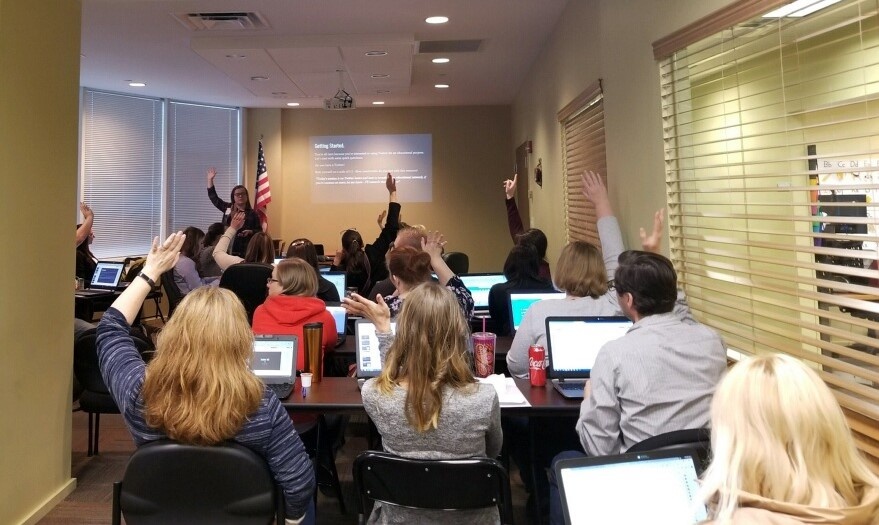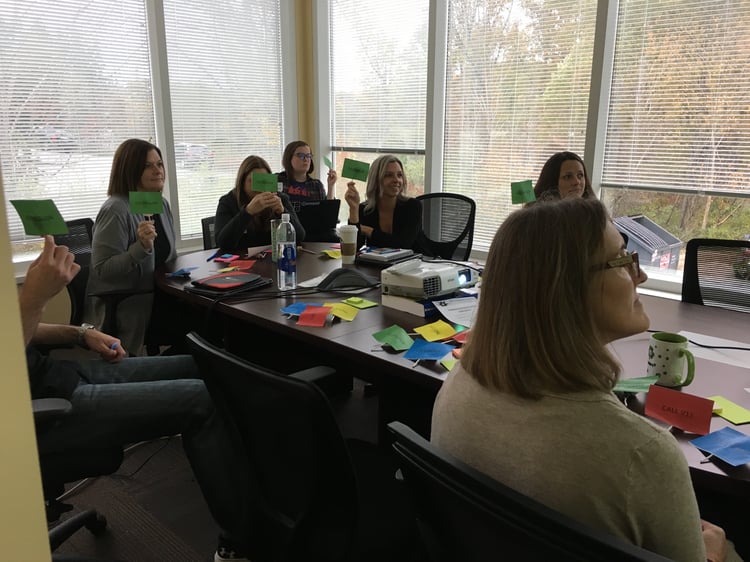Today our staff is spending an entire day devoted to professional development, and there’s a common thread throughout this year’s “Ed Camp.”
Being a school in today’s ever-changing world means we have to adapt. We believe it is education’s responsibility to adapt as the world changes, so we can best prepare students to thrive.
There’s one thing, however, that must remain consistent within our education: empathy.

We see and hear a lot of scary things on the news, on social media, or in the lunchroom at work or school. Technology moves fast, safety seems uncertain, and the world is becoming more globalized than ever. How do we prepare our kids to survive in today’s world?
We could focus only on educating a generation of skilled workers, but we believe success may require more than just that. That’s why we’re focusing so much on empathy.
A cyber school gives us a very unique platform to explore empathy, as our classes are full of students from many different backgrounds. One student may be here because he needs a flexible schedule for travel. His classmate may be here for safety reasons and has never traveled out of her town. Another student celebrates a holiday built into the school calendar, while another takes an excused absence to celebrate a religious holiday that is not part of our traditional school calendar.
All of these students are together in a class discussion about history and culture.
No matter the reasons our students are in cyber school, they’re experiencing education in a unique model where they interact with people who are very different than them. This opportunity helps prepare them to be global citizens, with the proper help from their teachers.
This is why it’s so important to focus on empathy. We need to be able to meet our students where they are and help them to understand one another.
We had 18 sessions for this semester’s Ed Camp, on topics such as Peer Collaboration, Science Demos in Cyber School, Mindfulness, and Cross-Curricular Magic. There were three, however, that especially focused in on the topic of empathy, and we wanted to share a little more about those sessions.
Cultivating Awareness: An Open Discussion on Cultural Representation
.jpg?width=322&name=20181102_111656%20(1).jpg)
PA Distance has an increasingly diverse student population, including ethnicity, religion, gender, socioeconomic status and much more. Because of this, it is imperative we as a staff lead the dialogue for an open discussion to ensure all students at our school feel safe, valued and included.
Through this discussion, we want to gauge everyone’s experience with encountering situations regarding race, gender, or other forms of representation, and begin the discussion as to what we need as a school in order best support all students.
We also want to create knowledge of key terms such as inclusion, diversity and equity so that positive dialogue and sharing can occur. This relates to the school purpose because we want to continue to build positive relations with all families and be aware of every family’s life situations and cultural traditions.
“This discussion makes us more empathetic because it gets us outside of the comfort bubbles of our known world, and shows us that our perspective isn't the only valid perspective,” shared Susannah Azzaro, PA Distance teacher and one of the leaders of this session. “I think that in order to be an authentic global citizen, we need to challenge our impulse to defend our positions and learn how to authentically listen to other people.”
We hope we can increase in empathy and develop a safe space for all of our students.
Engaging Students in Live Learning Using a Rotational Learning Model
While some sessions focus on preparing teachers to be empathetic educators, this workshop, taught by Marisa Petraglia, provides a teaching method to put into practice in their cyber school classroom.
A Rotational Learning Model is a highly collaborative approach to learning, which allows students to use higher order thinking skills to more deeply engage with content. Higher order thinking is learning that goes beyond memorizing facts. It could be connecting, categorizing, manipulating, applying, and/or problem-solving.
“Having small group work in my classes allows my students to build a community and collaborate with each other,” explained Miss Petraglia, “which are skills necessary for success after high school.”
She went on to explain her entire method to me.
“I start with short direct instruction lasting no more than 10 minutes. This direct instruction is important for students first learning a concept and allows them to later use higher order thinking skills to more deeply engage with the content. Students then work in small groups to complete tasks. These tasks cover different levels of difficulty. The students must work collaboratively in these groups to complete their tasks. Then, all students come back together at the end of class to complete a wrap-up activity that allows them to reflect on their work in class.”
You may wonder why this has anything to do with empathy. The collaborative approach exposes students to people who are different from themselves and new ways of thinking, making empathy crucial for productive conversations. For example, in Miss Petraglia’s Child Development class, they warmed up by discussing how they grew up - a discussion with many different sides.
Miss Petraglia has the ability to arrange her class discussion questions in such a way that empathy can be further fostered.
“Empathy is the first step to being a good citizen,” she said.
We’ve decided to share her presentation if you’re interested in learning this teaching method. Take a look here.
Responding to Sticky Situations

At PA Distance, we use a live learning model for our classes. This means our students engage in real-time with their teachers and classmates and have the opportunity to build relationships. Because of that, it is not uncommon for students to share their personal lives before, during, or after class. This can result in some sticky situations.
Today all of our counselors have broken up by grade levels to discuss practical steps teachers and staff can take during delicate and even crisis situations. Using scenario-examples, they work through best ways to respond to the delicate things that students may share, so as to respond with empathy, ethics, and legality.
It is very important that we have a crisis plan of action for all situations so our students can feel safe and understood. This empathy-in-action model can go a long way to protects students physically, emotionally, and intellectually.
PA Distance Learning is turning cyber school on its head through accessibility and personalization. We offer a safe learning culture for all K-12 students across the state of Pennsylvania.
Interested in learning more?


